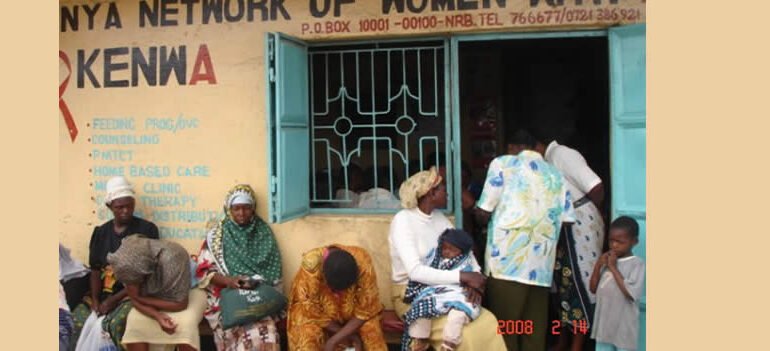Medical clinic Support - KENWA Kenya
- Home
- Medical clinic Support

Jul 17 2024
Medical clinic Support
Comprehensive Support Programs
Our Goal
Our goal is to provide comprehensive support to families affected by HIV/AIDS, including clinical support, mental health programs, and resources for orphans, through a variety of targeted initiatives.
Detailed Activities
- Mental Health Programs:
- Clinical Support:
- Resource Linkage: Develop a centralized system to connect affected parents and children with essential mental health resources used regularly by health professionals. This includes providing access to mental health hotlines, local mental health clinics, and specialized therapists.
- Decision Support Tools: Create decision support tools for healthcare providers to assist them in making informed decisions at the point of care, incorporating the latest mental health guidelines and best practices.
- Training for Health Professionals: Offer ongoing training programs for health professionals to enhance their ability to recognize and address mental health issues in parents and children affected by HIV/AIDS.
- Counseling Services:
- Individual and Group Counseling: Provide individual counseling sessions and group therapy for coping, crisis intervention, and mental health support.
- Pre and Post Test Counseling: Ensure that individuals undergoing HIV testing receive comprehensive pre and post test counseling to manage anxiety and emotional distress.
- Peer Support Groups: Establish peer support groups where affected individuals can share experiences, offer mutual support, and build a sense of community.
- Orphans Support:
- Education:
- Scholarships and School Supplies: Provide scholarships, school uniforms, and supplies to ensure that orphans can continue their education without interruption.
- Tutoring and Mentorship: Implement tutoring and mentorship programs to support orphans academically and emotionally.
- Shelter:
- Safe Housing: Provide safe and stable housing options for orphans, either through orphanages or foster care arrangements.
- Home Improvement: Assist with home improvement projects for caregivers who house orphans, ensuring living conditions are safe and healthy.
- Food and Clothing:
- Nutritional Support: Distribute food packages and nutritional supplements to ensure orphans receive adequate nutrition.
- Clothing Drives: Organize clothing drives to provide orphans with essential clothing and footwear.
- Legal Services:
- Legal Aid: Offer legal aid services to orphans to address issues such as inheritance rights, guardianship, and access to social services.
- Advocacy: Advocate for the rights of orphans within the legal system to ensure they receive the protections and support they are entitled to.
- Home-Based Care:
- Healthcare Services: Provide home-based healthcare services for families affected by HIV/AIDS, including regular medical check-ups, medication management, and emergency care.
- Training for Caregivers: Train family members and community health workers in home-based care techniques to ensure patients receive quality care at home.
- Nutritional and Psychological Support: Integrate nutritional counseling and psychological support into home-based care programs to address the holistic needs of patients.
- Information, Education, and Communication on HIV/AIDS:
- Drama and Puppetry Shows: Use drama and puppetry shows as engaging methods to educate communities about HIV/AIDS, prevention methods, and stigma reduction.
- Workshops and Seminars: Conduct workshops and seminars in schools, community centers, and workplaces to disseminate accurate information about HIV/AIDS.
- Printed and Digital Materials: Develop and distribute educational materials such as brochures, posters, and social media content to reach a wider audience.
- Advocacy, Networking, and Collaboration:
- Local and International Collaboration: Build partnerships with local and international organizations to share resources, knowledge, and best practices.
- Policy Advocacy: Advocate for policies that protect the rights of people living with HIV/AIDS and ensure they have access to necessary services and support.
- Community Engagement: Engage community leaders and stakeholders in advocacy efforts to create a supportive environment for those affected by HIV/AIDS.
- Promotion and Distribution of Condoms:
- Awareness Campaigns: Run awareness campaigns to promote the use of condoms as an effective means of HIV prevention.
- Free Distribution: Distribute condoms freely in high-risk areas, including schools, clinics, and community centers.
- Education on Safe Use: Provide education on the correct and consistent use of condoms to ensure their effectiveness in preventing HIV transmission.
- Home-Based Care (Repeated for Emphasis):
- Comprehensive Care Plans: Develop comprehensive care plans tailored to the individual needs of patients, incorporating medical, nutritional, and psychological support.
- Follow-Up and Monitoring: Establish regular follow-up and monitoring visits to ensure the ongoing well-being of patients receiving home-based care.
- Support for Caregivers: Offer support and respite care for family members and caregivers to prevent burnout and ensure they can provide sustained care.
Implementation Strategy
- Stakeholder Engagement: Collaborate with healthcare providers, educational institutions, community organizations, and government agencies to implement and sustain these programs.
- Research and Data Collection: Conduct research to identify the needs of affected families and use this data to continuously improve program effectiveness.
- Monitoring and Evaluation: Implement a robust monitoring and evaluation framework to assess the impact of our initiatives and make data-driven adjustments.
- Sustainability and Scalability: Focus on developing sustainable models that can be scaled up to reach more families and communities affected by HIV/AIDS.
By implementing these detailed activities, KENWA Kenya NGO aims to provide holistic support to families affected by HIV/AIDS, addressing their mental health, educational, legal, and healthcare needs, and ensuring they have access to the resources and opportunities they need to lead fulfilling lives.
KENWA KENYA
Contact Us
- Karen Professional Centre, Unit F9 Karen Rd, Nairobi Kenya
-
Kenya: +254723247196,
+254 722 63 63 60
International: +1 800-800-4321, +254740659657 - email: info@kenwakenya.org , kenwacentral@gmail.com Director: asunta@kawac.ca


Leave A Comment